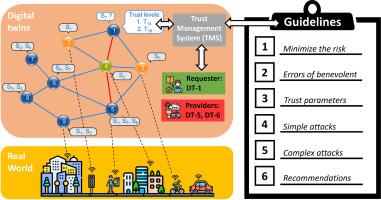在物联网中实现可信赖的数字孪生合作:基本设计准则概述
IF 4.6
2区 计算机科学
Q1 COMPUTER SCIENCE, HARDWARE & ARCHITECTURE
引用次数: 0
摘要
以数字孪生(dt)为代表的数十亿互联设备为特征的物联网(IoT)的发展,为确保可靠的通信带来了重大挑战。虽然服务水平协议(sla)和关键性能指标(kpi)为性能监控提供了基础,但它们在分散的场景中是不够的,在这种场景中,设备经常在不了解彼此的情况下进行交互。在这种情况下,信任管理系统(tms)作为一种可能的解决方案出现,以支持合作,评估数据和dt的可靠性。在这种情况下,本文通过博弈论方法对DT之间的交互进行建模,解决了物联网中的信任问题,其中每个DT被视为一个博弈理性的参与者。在此模型的基础上,我们导出了一组设计指南,用于开发同时考虑错误和恶意行为的tms。此外,我们应用这些指南来评估和比较文献中几种公认的tms,突出它们的优势和局限性。本文章由计算机程序翻译,如有差异,请以英文原文为准。

Towards trustworthy digital twins collaboration in the internet of things: An overview of essential design guidelines
The growth of the Internet of Things (IoT), characterized by billions of interconnected devices represented by Digital Twins (DTs), poses significant challenges in ensuring reliable communication. While Service Level Agreements (SLAs) and Key Performance Indicators (KPIs) offer a foundation for performance monitoring, they are insufficient in decentralized scenarios where devices frequently interact without knowing each other. In this context, Trust Management Systems (TMSs) emerge as a possible solution to support cooperation, evaluating the reliability of both data and DTs. In this context, this paper addresses the problem of trust in the IoT by modeling interactions among DTs through a game-theory approach, where each DT is seen as a game-rational player. Based on this model, we derive a set of design guidelines for the development of TMSs that consider both errors and malicious behaviours. Furthermore, we apply these guidelines to assess and compare several recognized TMSs from the literature, highlighting their strengths and limitations.
求助全文
通过发布文献求助,成功后即可免费获取论文全文。
去求助
来源期刊

Computer Networks
工程技术-电信学
CiteScore
10.80
自引率
3.60%
发文量
434
审稿时长
8.6 months
期刊介绍:
Computer Networks is an international, archival journal providing a publication vehicle for complete coverage of all topics of interest to those involved in the computer communications networking area. The audience includes researchers, managers and operators of networks as well as designers and implementors. The Editorial Board will consider any material for publication that is of interest to those groups.
 求助内容:
求助内容: 应助结果提醒方式:
应助结果提醒方式:


